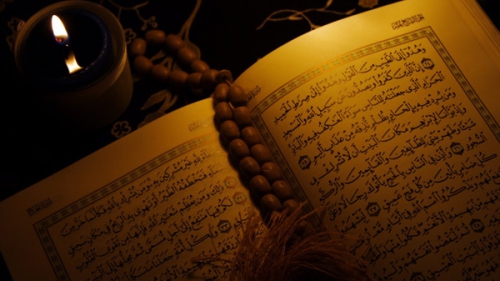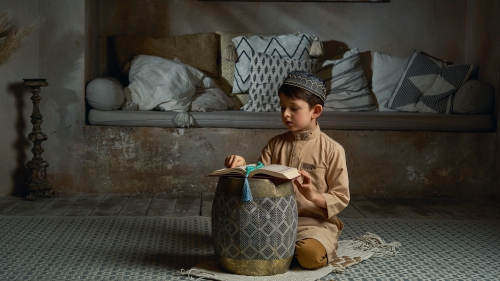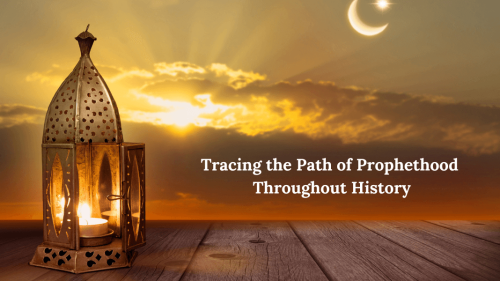The Life and Science of Al Beruni

1. HIS EARLY LIFE AND TIME
These days most of us seem to think that science is the sole concern of the West. During the last two hundred years or so, immense advances have been made in science and technology. This has mostly been the work of scholars of Europe and America. Through their untiring efforts, great changes have taken place in the lives of men. The standard of living of most of us has been raised to a level never reached before. The poorest among us enjoy a number of comforts, which in olden days, were not within the reach of even the richest. For all these things, our thanks are due to the great scientists of Britain, Germany, Italy, France and America. We in the East have remained comparatively inactive in the fields of science.
But the East was not always so backward. Some of the greatest thinkers of the world were born in the East. The Muslims were at one time, and for a long period, specially noted for their dedication to science. During the Golden Age of Islam (medieval age), there lived a large number of scholars who devoted their lives to the study of this department of knowledge. They might not have made astonishing inventions, but they laid the foundation of the scientific spirit. Thus, they prepared the way for that progress which is the special feature of our modern civilization. They were the torchbearers who led the way.
Among these leaders in the field of science, Al-Beruni was probably the greatest and certainly one of the earliest. He was born in 973 A.D. in a village outside the city of Khwarizm or Khiva in Central Asia, what is now Uzbekistan. The full name by which he is known in history is Abu Raihan Muhammad bin Ahmad Al-Beruni. In those days Khwarizm was a big city with a large number of villages around it. As Abu Raihan did not belong to the city proper but came from one of these villages, he came to be known as Al-Beruni which means "the outsider". The province of which this city was the chief town was also called Khwarizm. It is a beautiful region in Central Asia and is watered by the river Oxus and the smaller streams which flow into it. Its soil is rich and the rainfall is plenty. It is, therefore, covered with large forests and wide grasslands. In the days of Al-Beruni and for many years after that it had a large population. It was full of villages and little towns and most of the inhabitants were fairly well off. Almost all villages and little towns and most of the inhabitants were fairly well off. Almost all villages had little markets of their own where one could buy all that one needed.
At the time of Al-Beruni's birth in 973 A.D, the great Muslim empire had lost much of its ancient strength. Its capital was Baghdad from where the Abbasid Caliphs had ruled since 755 A.D. They had now become so weak that numerous independent rulers had sprung up everywhere. Khwarizm was conquered by the Arabs, at about the same time that Muhammad bin Qasim occupied Sindh. Many changes had come over this region during this long period of over two hundred years. When the Caliphs of Baghdad lost their original strength, one of the governors, named Iraq, became independent and set up a new line of kings. Al-Beruni was born in the reign of Ahmad bin Muhammad, the grandson of Iraq.
It is a matter of great regret what we know next to nothing about the childhood of Al-Beruni. We have no information about his parents beyond the fact that his father's name was Ahmad. When Al-Beruni grew up, he became a great author and wrote a large number of books. But in none of them has he told us anything about his boyhood or about his family. Perhaps, this was due to the fact that he wrote largely on scientific subjects in which there was little occasion to talk about himself. It is, however, almost certain that he did not belong to a rich or well-known family. An unfriendly poet once wrote a poem once wrote a poem finding fault with his forefathers. Al-Beruni replied by saying that a man's merit must not be judged by his birth but by his personal qualities.
During Al-Beruni's days there were no regular schools and colleges, as we know them today. In modern times, it is considered to be one of the foremost duties of every civilized state to make suitable arrangements for the education of its citizens. As you know, in Pakistan every village of any importance has a primary school and the bigger ones have middle schools. There are high schools in most towns while large cities have colleges where students receive higher education. The teachers get regular payment for their work and teaching is done according to set standards. Good books can be had in abundance at affordable price. The art of printing and the making of paper in immense quantities by machinery has brought education within the reach of everyone.
In the days of Al-Beruni such machines did not exist. Paper was made by hand and in small quantities. Naturally, it was very dear. Moreover, the art of printing was then unknown and all books had to be written by hand. It took many weeks, sometimes even months, to prepare a single copy of a book. As a result of this, books were very costly.
But from this you must not imagine that education was rare among the Muslims. The Prophet of Islam (Peace be upon him) urged all his followers to seek knowledge even though they might have to travel to far off China. When he began to preach the new faith, there was only a handful of men who could read and write. But this command about the search for knowledge had such a wonderful effect that, in a little over a hundred years after his death, the Muslims held the foremost place in the field of learning. Mosques had very early become centers of education and in time, schools and collages became attached to them. They were not run or aided by the Government, as they are today, but depended mainly on private effort. The teachers were often men of independent means and, therefore, did not want payment for their work. Noble men and well placed officials, including judges sometimes even ministers, took pride in devoting their spare hours to teaching.
This love for knowledge on the part of the Muslims did not grow less when the empire was divided into small kingdoms. On the other hand, surprising as it would seem, it increased. This was because local rulers tried to outdo one another in their encouragement of men of letters. Students and teachers were held in great respect. Even when there were wars between the neighboring chiefs, they were not disturbed, but were allowed to carry on their work in peace. Thus, the advance of learning continued unchecked.
When Al-Beruni was a boy, the region of Khwarizm enjoyed comparative peace under a local ruler of the house of Iraq. Like all other boys of that day, he must have gone to the mosque to read the Quran and to learn Arabic grammar. We know nothing about his first teachers. But whoever they were, they must have been struck by his ability and hard work. Al-Beruni was a Persian. But in those days the language of learning was Arabic. It is a difficult language with a great variety of word-forms and a large vocabulary of words. It is, however, clear that young Al-Beruni must have quite early gained a complete mastery over Arabic. For he soon began to use it to write his learned works and even composed verses in this language.
It appears that this promising youth had early attracted the notice of Mansur bin Ali bin Iraq, who was cousin of the king of Khwarizm. In one of his books, Al-Beruni speaks of this prince and his teacher. In another place we find a long Arabic poem of his in which he makes a brief mention of the people from whom he received encouragement and support. It includes two verses which refer to Mansur and the House of Iraq in the following words:
"Most of my time was spent in comfort and ease, while I held posts of great honor. The House of Iraq fed me with their milk and of them Mansur especially made my foundation strong."
This Mansur was not only a wealthy prince but he had also made his mark as a man of letters. He was a great scholar and made a special study of the mathematical sciences. He discovered some important theorems relating to trigonometry, which is a branch of mathematics and deals with the relation between the sides and angles of a triangle. Such a man was, indeed, an ideal guide and patron for the young Al-Beruni whose interest lay especially in the mathematical sciences. Under Mansur's fatherly care and able guidance, Al-Beruni must have made rapid progress. He must have been unusually quick in picking up the simpler principles and must have quite early started the study of the more difficult parts of mathematics. We may be sure that he soon gained enough knowledge to be able to help his teacher in his inquiries. The teacher, on his part, provided him with ample means of livelihood. This enabled them to work together like a team. In one of his letters, Al-Beruni mentions the name of twelve books which Mansur had attributed to him. We have no doubt that they were the product of their joint labor. In a spirit of generosity and self-sacrifice, the teacher gave the whole credit to his pupil for works, in which the latter's share was perhaps smaller then his own. Mansur must also have written other books which were the fruit of his unaided effort. But unfortunately, they have been lost. There exist only one little book in a library at Cambridge which bears Mansur's name along with that of his learned pupil.
2. POLITICAL CONDITIONS AND HIS SEARCH FOR KNOWLEDGE
It appears that Al-Beruni spent the first twenty-three years of his life at Khwarizm. We are quite certain that during this period, he led a comfortable life through the generosity of his teacher and the members of the ruling family. But about that time, the House of Iraq was overtaken by slings and arrows of outrageous misfortune and its last ruler, Abu Abdullah was put to death by a neighboring chieftain, Mansur bin Muhammad. Al-Beruni was then obliged to bid farewell to the land of his birth. He spent some time in wandering about from place to place and at last came to Rayy. His condition was then pitiable. He was in a strange city without money of friends. He must have been reduced to extreme poverty, as may be judged from certain verses of an old poem in which he says:
"An old has said that a man's worth depends upon two little things, his heart and his tongue. I find from experience that a man's worth depends upon two pieces of silver. If a man has no glittering coins in his pocket, nobody pays heed to him, not even his wife."
To stress the same point, Al-Beruni adds the following story:
"While I was staying at Rayy, I went to see a person who was considered at that time to be the greatest scholar of astrology. On a certain problem, I expressed a difference of opinion with him. He felt so offended that he was rude to me and used improper language, although in knowledge he was far inferior to me. He was rude chiefly because at that time I was in a miserable condition for want of money. Later, when my condition improved, the same person began to seek my friendship."
From Rayy Al-Beruni went to Qabus, the enlightened ruler of Jurjan and Tabaristan. Qabus was a great scholar of Arabic and his handwriting was especially beautiful. He also wrote good Persian verses and greatly interested in astronomy and philosophy. He was a great patron of learning of scholars were always welcome at his court. It was to him that Al-Beruni dedicated in 1000 A.D. his first great book, Asar Al-Baqiya, the detailed account of which we will give a little later. But although Qabus had a special regard for learned men and was very generous to them, he had one great weakness. He had a bad temper and at times he was so harsh and cruel that he would put people to death for small faults. Al-Beruni did not like this and left Jurjan after a short stay.
In the meantime, conditions had become favorable for him in his own country. The new rulers of Khwarizm, who had displaced his former patrons of the house of Iraq, had become impressed with his fame. Ali bin Mamun, the second king of this new line, invited Al-Beruni to his court. The king had a very able minister who was fond of scientific studies. As a result of his love of learning, the court of Khwarizm had become a meeting place for scholars of note. One of these was the great philosopher and well-known physician, Abu Ali bin Sina. Debates on scientific subjects were sometimes held between him and Al-Beruni. But like most debates they solved nothing and merely created bitterness between the two great men. Chiefly, on account of his great book on medicine, "the Qanun", Ibn Sina enjoys far greater fame then Al-Beruni. The latter, however, was a far more original thinker. He took delight in searching out facts for himself and made valuable additions to the existing knowledge of his times. Ibn Sina on the other hand, contented himself largely with explaining and expanding what the Greek philosopher, Aristotle had written.
The respect, Al-Beruni enjoyed in the sovereign's court of Khwarizm, is evident from this incident. One day the King of Khwarizm was going in procession with royal pomp and dignity. He happened to pass by Beruni's house. The king ordered the procession to stop and sent a message to Al-Beruni that the king was waiting for him. Al-Beruni took sometime to get ready and see the king. The king decided to dismount the horse and go to Al-Beruni himself. When he was about to dismount, Al-Beruni came out and implored to the king to keep seated. The king, who was a great patron of scholars, on hearing Al-Beruni's earnest request, recited a poetic composition in Arabic. It mean: "Knowledge itself is a respectable city, it does not go to the people, but the people go to it."
The story that Sultan Mahmud of Ghazna invited Ibn Sina and Al-Beruni to his court does not seem to be correct. It is more probable that when Mahmud conquered Khwarizm, Al-Beruni was obliged to leave his native city. It was no longer the seat of a splendid court but had become and unimportant provincial town. Al-Beruni then went to Ghazna (Afghanistan) to seek his fortune. However, he never forgot the kindness of his old patrons and in his poem we find verses in which he says:
"The House of Mamun, especially Ali Bin Mamun gave me full encouragement and support and the last of them named Mahmud made me rich and famous and raised my rank."
Mahmud knew Al-Beruni's worth and received him with open arms. About him, he says in the same poem:
"Mahmud never kept back wealth from me. He made me rich and satisfied. He overlooked my faults and held me in respect and raised me to a high position."
He lived in Ghazna until 1019 A.D. and mostly kept himself busy in the observation of stars. Mahmud had erected for him and observatory which is a building specially suitable for the observation of heavenly bodies and provided with necessary instruments.
3. VISIT TO INDIA
Al-Beruni was now forty-five. But his thirst for knowledge was as great as ever. He had mastered the Greek sciences through Arabic translations. But he could not say the same thing of the Indian sciences. Some Indian works on astronomy and other branches of mathematics had been translated into Arabic during the early days of the Abbasi Caliphs. But the translations were extremely faulty and, therefore, unsatisfactory. Al-Beruni felt that he must go to India and learn from the original source. Luckily for him, the country had just been opened to the Muslims by the victorious campaigns of Mahmud.
Al-Beruni went to India and diligently applied himself to the study of Sanskrit. Just imagine a man past middle age, trying to learn a strange alphabet and to repeat the unfamiliar words. To many an easy going student this might look like a hopeless task. But his constant patience and hard work paid rich dividends. Certainly, it did not take him long to gain mastery over this difficult language. The Hindu pandits are well known for their possessiveness and have always tried to keep their knowledge a close secret. But helped by his sweet temperament and polite manners, he gained entry into their learned circles. They soon realized his worth and learnt the Greek sciences from him, teaching him their own in return. Al-Beruni lived in India for ten years and spent most of his time in Multan which was then a great centre of Hindu learning in the north. This is what he says about the pandits:
"So long as I was unable to understand their language, I behaved as their pupil. But after I had learnt their speech, I was able to show them my knowledge. They were so deeply impressed with it that while speaking to their great men about me, they called me 'vidyasagar' which means ocean of learning."
Al-Beruni made good use of the time he spent in India. Not only did he make himself a master of their science of astronomy and astrology and other branches of mathematics, but he also made a careful study of their customs, religion, history and philosophy.
He was the first Muslim who introduced Indian chess to Islamic countries and explained the problems of advanced trigonometry.
4. HIS WORKS AND DISCOVERIES
In 1029 A.D., Al-Beruni returned to Ghazna. He used the results of his Indian studies to write his second great work, the Kitab-Ul-Hind. About 30 years earlier, he had written his first great work, Asar Al-Baqiya which we have already mentioned.
Asar Al-Baqiya
In the author's words, it gives a detailed account of the areas of the different nations inhabiting the earth; tells us when they began; why different nations adopted different areas; which are the months in which their years are divided; and what are their fairs and festivals.
It is clear that the subject of this book is very vast and in a way, a chronology of ancient nations containing minute and accurate details of geographical and historical information. One can imagine the immense amount of labor which its completion must have required.
Kitab-Ul-Hind
Apart from his personal observations, the book contains valuable information about geography, history, art, science, religious beliefs, social customs, culture and civilization of Hindus and India. The book has been translated into German and English and its Urdu version is also available in Pakistan. Commenting on the book, a European writer says: "The Hindus must consider them as fortunate that a great truthful scholar of his time depicted a picture of their forbearers' culture and civilization as it was then. It is possible that there may be differences among Hindus about Al-Beruni's views, but this fact cannot be denied that he has described with great admiration the Hindu culture and civilization as an impartial observer."
Astronomy and Astrology
Al-Beruni was a pioneer in these fields. In the field of Astronomy, he named various stars and studied in depth their orbital movements. Moreover, he minutely studied the solar system and after some calculations gave scientific reasons for days or nights getting longer or shorter; absence of night in some parts of the world; change of seasons; waxing and waning of moon. Al-Beruni explained the difficult subjects of Astrology in easy language in the form of questions and answers. For this subject, he mainly relied on old Greek books, Hindu religion and some verses of the Holy Quran. He could piece together various events and foretell the future with remarkable accuracy.
Al-Qanun-Ul-Masudi
After the death of Mahmud, the throne of Ghazna was occupied by his son Masud. This book was dedicated to Sultan Masud. As a ruler Masud was not a success, but he was a great patron of learning and an accomplished scholar himself.
Al-Qanun-Ul-Masudi deals with a variety of subjects such as mathematics, astrology, geology, geography, chemistry, mineralogy, optics and a host of other scientific subjects. The book was published in 1030 A.D.
It is said that Sultan Masud tried to reward the labors of great scientist by presenting him with an elephant laden with silver. Al-Beruni, however, was a true scholar and the idea of making money out of his learning was simply hateful to him. With many thanks and excuses, he returned the generous gift to royal treasury.
Kitab Al-Saidana (Materia Medica)
It deals with medicine, anatomy, health care and hygiene. The book contains more then 700 descriptions of drugs and their effects on human body. The book also explains at length the treatment of various diseases.
Kitab-Al-Jawahar
This book explains the variety of precious stones and gems and their specific gravity. It tells us which parts of the earth contains mines and minerals; the properties of the earth where mines and minerals are discovered.
We have selected and discussed briefly the important works of Al-Beruni. It is said that he had written over a hundred books and they contained more then 13,000 pages in all. Most of them have been lost and hardly one-tenth of what he wrote has come down to us. For the most part his writings deal with difficult subjects which it is not possible for young people to understand. In sum, the subjects he dealt with included astronomy, chronology, geography, mechanics, mathematics, medicine, pharmacology, meteorology, mineralogy, history, philosophy, religion, literature and magic. One or more books on these subjects have survived.
Discoveries
A few simple scientific facts which he was the first to discover are mentioned here. Al-Beruni explained the working of natural springs by the principle that water keeps its level. From the observation of the stones and layers of the earth in the Indus Valley, he arrived at the correct conclusion that it was an ancient sea basin. He found the latitudes and longitudes of a number of important towns and discussed intelligently the problem of the earth's rotation on its axis. He also discovered that light travels faster then sound. It was Abu Raihan Al-Beruni who gave methods for drawing on paper, which has a plane surface, maps of portions of the earth which has a curved surface. He found with great exactness the specific weights of 18 precious stones and metals. He also recorded the densities of various metals, liquids and gems. Al-Beruni's calculation of the circumference of the earth was only 80 miles off from the modern measurement (i.e. 1/5 of 1%). He also discovered an Astrolabe, an instrument used for measurement of celestial bodies and as an aid in navigation.
5. END OF THE LUMINARY
Only a waning candle sheds its light around. It is related that Abul Hassan Ali, a jurist and friend of Al-Beruni visited him when he was terminally ill. Al-Beruni requested him to repeat the mathematical problem he was once discussing with him. Thinking that it was not an appropriate occasion to talk about it, the jurist remained silent. Al-Beruni insisted upon having a reply and said: "Is it not better to die with knowledge then to die in ignorance?" Abul Hassan repeated that problem to which Beruni listened intently and grasped it. A few moments later he passed away at the age of 75 in 1048 A.D. and was laid to rest at Ghazna. Thus, he acted upon the saying of the Holy Prophet Muhammad (Peace and blessings be upon him): "Acquire knowledge from the cradle to the grave."
He was an ideal student who spent all his life in search of knowledge. His early biographer writes: "He never had a pen out of his hand, nor his eyes ever off a book and his thoughts were always directed to his studies." Abu Raihan Al-Beruni was never satisfied with taking things for granted, but always made a thorough examination. He realized the importance of experiment and observation and thus prepared the way for modern science. According to George Sartan: "His critical spirit, toleration, love of truth and intellectual courage were without parallel in medieval ages." He was undoubtedly a physician, astronomer, mathematician, physicist, historian and perhaps the most prominent figure in the galaxy of universally recognized learned scholars who marked the golden age of Islamic science.
Following are some questions to consider for academic exercise.
QUESTIONS
- What has science done for us?
- Compare the system of education of Al-Beruni's days with that of our own.
- Who was Mansur bin Ali? What part did he play in making Al-Beruni great?
- Mention some of the scientific facts which Al-Beruni discovered or discussed.
- Give an account of some of the writings of Al-Beruni.
- Explain the meaning and significance of "only a waning candle sheds its light around."
ABOUT THE AUTHOR
Mr. Haroon Ishaque Jangda, graduated in Arts in 1960 and in Law in 1962 from the University of Karachi. He was called to the English Bar in 1969 by Lincoln's Inn, London. Since 1971, he has been practicing Civil and Constitutional Law in the District Courts, the Sindh High Court, and the Supreme Court of Pakistan. A prolific writer , he was awarded the "Citizen Four Seasons Award" by the Reader's Digest Association Far East Ltd. for his essay "Why does a salmon swim upstream in the Summer" in 1981 and second prize in the Essay Competition held in 1982 by the World Memon Foundation (Pakistan Chapter) for his essay "Community related problems and practical ways to solve them." He is the author of "The Battle for Pakistan" published by Ferozsons in 2000. Apart from writing, the author is a community and social welfare worker.
Topics: Islam, Islam And Science Values: Education, Knowledge
Views: 34154
Related Suggestions
We, Muslims, are living in the past - what major discoveries have we done in mathematics since 1700's. Forget 1700's: even the 20th/21st century what have Muslims as a whole done in mathematics/physical sciences.
And we didn't invent number system. We had extended that and made use of it more than anyone had before. '0' was not invented by us but we put it to good use.
Asif

















